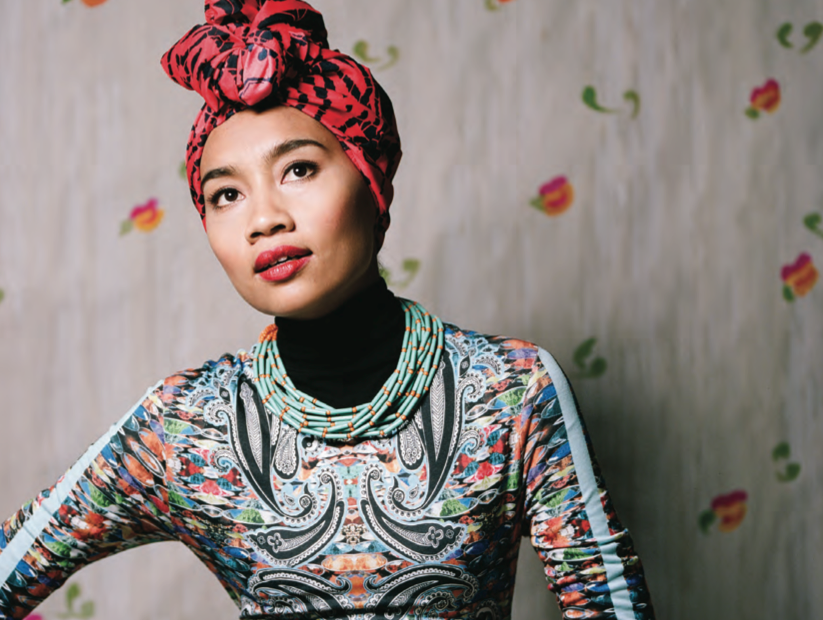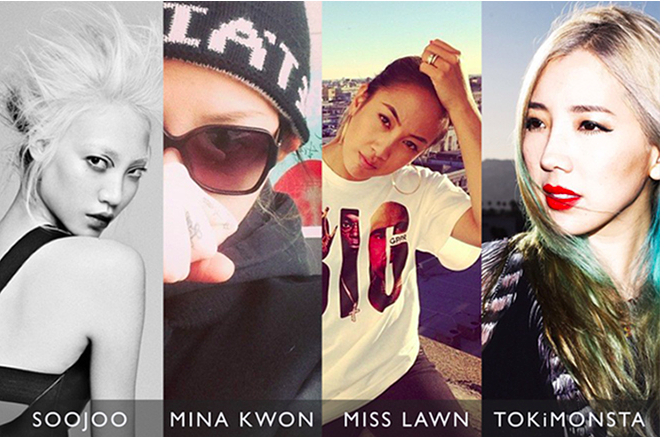Story by Ada Tseng.
Singer-songwriter Yuna Zarai (known as Yuna) has a quick and easy remedy for writer’s block: “I just call up my best friends and ask, ‘Hey, do you have any drama that I can write about?’ Usually, they’re like, ‘Sure!’ And then I’ll show them [the resulting song] as a gift.” She laughs. “My friends are so easy.”
Many of her self-penned songs are about relationships – from happy-in-love songs (“Lullabies,” “Favourite Thing”) to heartbreak (“Mountains,” “I Want You Back”) to a perfectly satisfactory fling you know won’t last (“Lovely Intermission”). “Decorate,” a song from her first international EP in 2010, about missing a recently departed lover so much that you keep your home decorated with objects that the person likes just in case he or she comes back, is another example of a track inspired by one of her male friends. “It’s such a sad song, and a lot of people think I went through that,” she says. “[But] I’m really close to my best friends, so if they feel sad, I feel sad, too. It’s emotionally draining, but I get affected immediately.”
The 27-year-old grew up in Malaysia, making a name for herself in her home country before relocating to Los Angeles a few years ago. Her self-titled international album Yuna, released in 2012, had a famous supporter in Pharrell Williams, who produced her hit single “Live Your Life” and often mentioned her name when interviewers would ask him about new artists to follow. In addition to her music, Yuna is a fashion trendsetter as well. She runs her own online store November Culture, and earlier this year, she launched her own clothing line 14NOV, which features more conservative clothing such as headscarves, turtleneck maxi-dresses and oversized cardigans. “There are a lot of girls, especially in Los Angeles, that want to dress up sexy and fabulous,” she says, “but there are also a bunch of girls like me that would rather cover up!”
The Malaysian singer has gotten a lot of questions about her Muslim heritage since her debut in the United States, a country not accustomed to seeing a pretty girl in a turban singing and strumming her guitar onstage, but Yuna tends to downplay any potential politics in favor of talking about her music. In some ways, despite her uniqueness (the eye-poppingly beautiful fashion plate would stand out in a crowd even if she weren’t the star of the show), she comes across as your typical girl-crush. Dressed in a shimmery black-gold headscarf with gold statement necklaces and a long, black pleated skirt (“I’m really into black and gold right now,” she says), she was charismatic performing at a sold-out Bootleg Theater show in Los Angeles last December, for an audience that happened to include her own parents who had flown out from Malaysia to see her.
[wp_ad_camp_1]
Yuna started creating music on the piano when she was 14, but songwriting remained a mystery to her until she picked up the guitar at 19. As soon as she learned how to play three chords, she started making up songs for her friends, teasing them about liking boys or not being over their exes.
Yuna essentially learned English through music. “At first, it was just me re-creating songs I already knew,” she says. (Her English is now fluent, with only a hint of Malay accent.) Inspired by many American female singer-songwriters, including Fiona Apple and Lauryn Hill, as well as Malaysian artists like Ning Baizura and Sheila Majid, Yuna says she feels more comfortable writing lyrics in English, where you can be more conversational. “Malay is such a beautiful language that when you write songs in Malay, it has to be poetic.” She’s only written seven Malay songs – one per year she’s been in the business, she jokes.
“Deeper Conversation” was the first song she wrote that garnered public attention. In her last term studying law at university, she started a MySpace page for her music. Soon enough, she started getting requests to perform at jazz bars in Kuala Lumpur, the radio began playing her songs, and she was making a name for herself in the Malaysian independent music scene.
Her father, who worked in law but loved playing the guitar, was especially supportive, as he was the one who used to take his daughter to record stores when she was younger. “He said, ‘Only once in a while is there someone like you who can write music, so you have to pursue it,'” Yuna remembers.
Meanwhile in Los Angeles, Carlo Fox and Ben Willis from the indie record label and management company Indie-Pop Music had stumbled upon Yuna online. At the time, MySpace had an independent music chart, and Yuna’s Malay music was in the Top 10. If only she sang in English, they thought. When they found she did, they became obsessed with finding her.
Yuna admits she was a little suspicious of these American strangers who wanted to meet her. When she didn’t respond, Willis went on Facebook and started friend-requesting as many of her followers as he could (at the time, she had about 300,000; now, she has almost 2 million).
“She probably thought I was an Internet stalker,” says Willis. “But literally, the first person to hit me back happened to be her mom, who told her, ‘Just get on the phone with this guy. He sounds really nice!'”
“I probably didn’t respond until six months later,” says Yuna. “I was busy, and I didn’t have the courage to think about going to America. But in the end, because I had all this English music that never made it in Malaysia, I knew that I couldn’t discover my own true strength until I gave it a try.”
“I had never been to Malaysia,” says Willis, who ended up flying over by himself to meet Yuna. “But when I got there, she and her cousin picked me up, and she gave me the key to my hotel. She said, ‘Don’t worry, we’ll take care of you when you’re out here.’ And I was like, ‘Wait, what? I’m the one who’s trying to sign you.’ But I hung out with her, her bandmates and her family members for three days. We really clicked. I said, ‘Look, I want to help bring your music to rest of world,’ and the rest is history.”
Last October, Yuna released her second album, Nocturnal, on the Verve Records label. This work allowed her to experiment further in creating her signature sound – pop with hints of traditional Malay music. “Falling” uses an African thumb piano called the kalimba to make a gamelan sound, heard in a lot of Southeast Asian music. “Mountains” was inspired by what Yuna calls “a Borneo vibe,” whereas “I Wanna Go” makes use of the kompang, a Malay tambourine.
[wp_ad_camp_2]
But her hit single “Rescue,” inspired by the Malay music form dikir barat, might be the one song that you can’t get out of your head. A women empowerment ballad inspired by her girlfriends, as well as influential women she had just met at a United Nations event, the chorus is about how even when things in life get a little difficult, the girl’s got light in her face / She don’t need no rescuing, she’s OK.
In 2012, Yuna was recognized with a National Youth Icon Award, awarded by the prime minister of Malaysia for her exceptional achievements in arts. But nowadays, it’s not just Malaysian fans that gush about her influence anymore.
“Once the rest of the world feels the way we feel about her, she’s going to be a game-changer,” says Willis. “And not just from the musical perspective. Whenever she’s ready, I think she’s a massive cultural figure who’s been put here to do important things.”
Want more Yuna? CLICK HERE to hear her alluring, can’t-get-it-out-of-your-head music.
This story was originally published in our Spring 2014 issue. Get your copy here.











